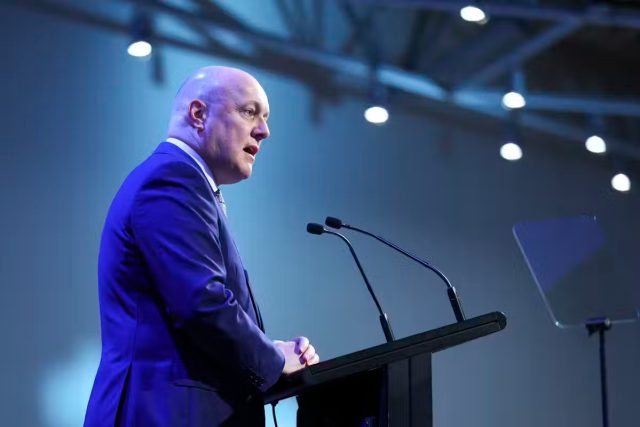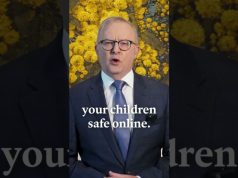WELLINGTON, Thursday, May 08, 2025 (WNP): New Zealand Prime Minister Christopher Luxon has unveiled a draft law aimed at banning children under the age of 16 from using social media, citing growing concerns over cyberbullying, exposure to violent content, and social media addiction among young people.
Under the proposed legislation, social media companies would be required to verify that users are at least 16 years old before granting access to their platforms. Companies failing to comply could face fines of up to NZ$2 million (approximately US$1.2 million).
“This is about protecting our children,” Luxon said during a press conference on Tuesday. “It’s about making sure social media companies are playing their role in keeping our kids safe.”
The Prime Minister said the proposal was driven by widespread concerns from teachers and parents about the detrimental effects of social media on children. Issues raised include exploitation, addiction, and constant exposure to harmful and age-inappropriate content.
“Parents are constantly telling us that they are really worried about the impact that social media is having on their children,” he said. “They are struggling to manage access and looking for more support.”
The bill, authored by National MP Catherine Wedd, addresses the current lack of enforceable age-verification protocols in New Zealand’s digital landscape. Wedd said the legislation would help empower families by making online environments more accountable and transparent.
The proposal is modeled after Australia’s recent landmark move to ban social media access for users under 16 — one of the strictest measures globally. Passed in November, the Australian law triggered strong backlash from major tech firms, who criticized it as vague and rushed.
Despite potential pushback, public sentiment in New Zealand appears to favor tighter regulation. A December 1News Verian poll showed more than two-thirds of New Zealanders support restricting access to social media for minors under 16.
To become law, the bill will need backing from Luxon’s two coalition partners in the centre-right government. Though a timeline for parliamentary introduction has not been confirmed, Luxon called for cross-party support.
“This is not a political issue; it’s a New Zealand issue,” he said, expressing hope for bipartisan consensus.
Opposition Labour Party leader Chris Hipkins signaled cautious openness to the idea, telling Radio New Zealand, “This is a conversation we need to have as a country. The Australians have been courageous and tackled it. I think New Zealand needs to do the same.”
If passed, the legislation would position New Zealand among the global frontrunners in regulating social media access for minors.
Why banning social media for under-16s
As New Zealand considers a groundbreaking proposal to ban social media access for children under 16, critics are raising serious questions about whether such a move truly addresses the complex realities of young people’s online lives — or simply offers a politically convenient solution to a much deeper issue.
While the bill introduced by Prime Minister Christopher Luxon’s government is intended to curb harms like cyberbullying, exposure to violent content, and social media addiction, experts warn that the justification for such a blanket ban rests on shaky scientific, social, and ethical ground.
The Addiction Misconception
Campaigners such as the advocacy group ‘Before 16’ compare social media to tobacco, portraying it as a public health threat. But this analogy oversimplifies a more nuanced issue. Most young people aren’t “addicted” in the clinical sense — they have habitual relationships with these platforms, which, while hard to break, don’t meet the threshold of a medical disorder.
Framing social media use solely as a source of dopamine hits and “junk content” implies it is inherently less valuable than offline experiences. Yet young people often derive real connection and meaning from their online interactions.
Oversimplifying Exposure
The current political rhetoric suggests young people are passively “exposed to” social media, as though it’s a harmful substance in the air. But social media is not one-directional. Young users actively engage with platforms to build identities, express themselves, connect with distant family members, and even seek emotional support. Reducing the experience to mere exposure erases its role as a social and cultural tool.
Flawed Science Behind the Ban
One of the intellectual cornerstones of the ban is Jonathan Haidt’s The Anxious Generation, which argues that social media causes anxiety and depression among Gen Z. However, this causal link has been widely contested. Mental health trends among youth also correlate with external pressures — from climate anxiety and economic precarity to political instability — making social media an easy scapegoat.
A Spectrum of Online Experiences
Assumptions that all social media use is harmful ignore the diversity of experiences. Not every user spirals into toxic comparison loops. For some, online platforms provide empowerment, education, and positive social validation.
Moral Panic and Technophobia
The backlash against social media resembles historical reactions to disruptive technologies. “Phubbing” (snubbing someone by using a phone) and similar behaviors have been labeled threats to social norms, but such changes are inevitable. While literacy patterns evolve, social media fosters other important skills, such as visual storytelling and rapid communication.
Marginalized Youth Bear the Brunt
For marginalized youth — LGBTQ+ individuals, immigrants, or those in isolated communities — social media can be a lifeline. It may be the only place where they can express themselves, find belonging, or stay connected to cultural roots.
Implementation Hurdles
Even if the law is passed, questions remain about its practical enforcement. Australia, which passed a similar law, still struggles with the logistics. Age verification systems are controversial, raising privacy concerns and potentially exposing all users — not just minors — to increased data collection.
Stifling Youth Innovation
Teenagers have long been tech pioneers, developing subcultures like “Finsta” (fake Instagram) to navigate social pressure. Restrictive legislation risks stifling this creativity and could widen the digital literacy gap between generations.
Teaching Disconnection
Rather than banning social media, why not teach students how to manage it? Digital literacy curricula could include exercises in “unplugging,” helping students examine their own media habits and fostering healthier digital routines.
A Smarter Alternative
Acknowledging the harms of social media doesn’t mean we must eliminate it. Experts suggest a more effective path would involve regulation — designing safer digital environments, strengthening protections against manipulative algorithms, and supporting children’s rights online. Just as we’ve regulated physical spaces for safety, we can do the same for digital ones.




